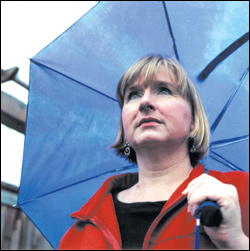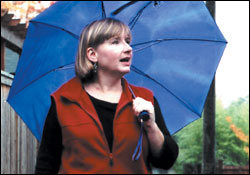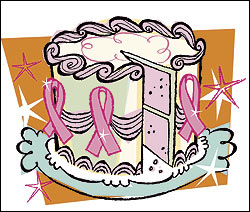I woke in a panic early on Dec. 10, the day my story, “Running With Fear,” was to appear in Seattle Weekly. Publishing it was a mistake, I thought, and I wanted to call Editor in Chief Knute Berger and ask him to recall the delivery trucks. I feared that it was just a big, self- indulgent dumping of my emotions. Why would people want to read about my life with metastatic breast cancer? It was too late, of course, and when I took the dog for a walk through the University District, on every block, it seemed, there was a bright red Seattle Weekly box framing my face.
The first response came by e-mail from Liz Records, a cervical cancer survivor I met when I profiled her for the Seattle Cancer Care Alliance (SCCA) Web site. “You have an amazing talent for capturing the importance of thoughts that go through the mind when one is ill,” Liz wrote.
I started to feel better. This was the first of several dozen letters showing that readers got what I was trying to say about living with cancer.
Writing “Running With Fear” was painful but cathartic for me and, I know, painful for many people to read. Several strangers have told me that they read it in tears. It also brought me new friends and writing opportunities. And, of course, all of this played out against the background of my latest chemotherapy, six months of weekly Navelbine—which, although easily tolerated, brought me to the brink of bankruptcy.
New Friends
Through the Seattle Weekly article, I gained two new friends, both named Jill, both in their 40s, both living with metastatic breast cancer. They are the friends that I didn’t know I was missing.
Jill Bennett, who has been in and out of cancer treatment for 13 years, founded Northwest Cancer Partners, a nonprofit organization dedicated to speeding promising new cancer treatments into clinical trials. We get treatment at SCCA with the same drug and sometimes meet up there for a cup of tea.
During my latest round of treatment, when I was tired and avoiding many of my friends, I still wanted to see Jill. “We talk in code,” she says. “No comment is wrapped with a bow—it’s said straight on. . . . We both know what we have, we both know the reality.”
The other Jill is Jill Cohen, who was diagnosed with breast cancer in 1999 while working as the manager of the Northwest AIDS Walk. Her cancer returned in 2002, when it metastasized to her bones, as mine did, and she retired on medical disability. I can’t say she’s slowed down much. Cohen is active in the Young Survival Coalition, for women diagnosed with breast cancer before age 40, and manages Club-Mets-BC (listserv.acor.org), an online support group for women living with metastatic breast cancer.
Jill wanted to meet me after reading “Running With Fear” because, she says, “We who have ‘mets’ are the hidden story behind all the talk about breast cancer successes.”
“It’s been great to meet someone who is coping with the same illness that I have,” she says.
Writing Opportunities
Jeanne’s Diary, the series of articles I wrote in 1998 and 1999 when I was first diagnosed with breast cancer, is back on the Web (www.jeannesdiary.com/home/jd/). I’m working on expanding “Running With Fear” into a book about living with metastatic cancer.
And I continue to write for the SCCA Web site (www.seattlecca.org,). Right now, I’m working on the lung cancer pages, then I’ll move on to prostate and head and neck cancers. I’ve also written some articles about promising new breast cancer treatments chosen to receive grants from Northwest Cancer Partners (NWCP).
One is a way to boost T cells to fight metastatic breast cancer, another is a new targeted therapy for breast cancer cells that are resistant to chemotherapy, and the third is a new cancer drug from a plant used in Chinese herbal medicine. All three projects focus on breast cancers that do not respond well to conventional therapies. These are pretty exciting and give me hope that new treatments will be there for me when I need them.
Bankruptcy
I don’t know a single person who has faced a life-threatening illness—AIDS, heart disease, or cancer—without going bankrupt. I’ve been fortunate, as a single parent and the breadwinner, to survive more than five years of treatment without going financially belly up. I’ve also been extremely fortunate in that I’ve felt well enough to work throughout most of this time.
As the six months of my most recent chemotherapy wore on, though—grinding me down—my income dipped and my debt grew. My out-of-pocket medical expenses last year and in 2002 equaled about one-quarter of my pretax gross income.
In January, when I realized I was in trouble, I saw a bankruptcy lawyer, who suggested alternatives. While I was exploring these options, including refinancing my house, I called my credit card companies, none of whom I was delinquent with yet, and explained my situation and my intent to pay them as soon as I either refinanced or filed for Chapter 13. Despite that, every single one of these companies began to badger me for payment. I receive daily phone calls.
As of this writing, I have learned I can’t refinance my house because of something called the debt-to-income ratio, and I have not yet filed for bankruptcy. A friend has offered to make me a loan. Most people in my situation don’t have wealthy, generous friends and end up broke.
Chemo
The good news is that when I finished six months of chemotherapy, with a final treatment April 2, my oncologist, Dr. Robert Livingston, told me I am back in remission. This doesn’t mean treatment is over: It will never be over. I need to continue with Herceptin, a targeted antibody that attacks my specific type of breast cancer, and another drug that helps keep my bones strong.
I also plan to join a clinical trial of a breast cancer vaccine. This is a bit scary, as there are always unknown risks with a clinical trial, but at this point it is probably my best bet for pushing my cancer back one more time. And I feel that I owe it to all the brave women who went before me and enrolled in clinical trials of new treatments, including Herceptin—the drug that has bought me precious time.






